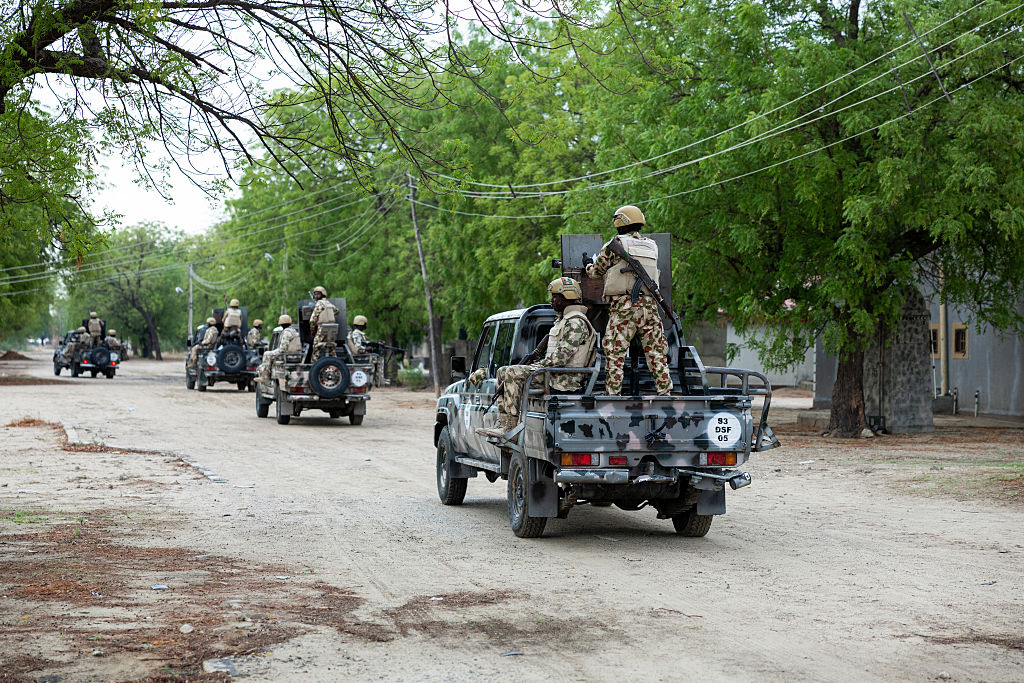The African Union chief did not mince his words. On Wednesday he rejected U.S. President Donald Trump’s accusation that “record numbers” of Christians were being killed in Nigeria. “Think twice before… making such statements,” Mahmoud Ali Youssouf told reporters at the U.N. headquarters in New York. “The first victims of Boko Haram are Muslims, not Christians.”
[time-brightcove not-tgx=”true”]
The comments are an apparent rebuke of President Trump’s sudden interest in Nigeria, and his threat to go “guns-a-blazing” in Africa’s most populous nation. President Trump has designated Nigeria a “Country of Particular Concern” and has justified the threat of U.S. intervention based on the “Christian genocide” narrative that has recently gained traction in conservative circles. The Nigerian government has strongly pushed back on these claims, arguing that while violence certainly exists in a country home to more than 200 ethnic groups roughly split between Muslims and Christians, it impacts all religions, “Muslims, Christians, and those of no faith alike.”
As Africa’s largest economy and biggest oil producer, Nigeria has regional and continental influence but has long suffered from extremism and internal insecurity. The roots of violence in Nigeria are complex and multifaceted, ranging from Islamist terrorism to an ongoing conflict between farmers and Fulani herders.
Nigeria and the U.S. have a complicated bilateral relationship, with strong trade and security ties punctuated by periods of friction. In the two decades following Nigeria’s return to democracy in 1999, the country was among the top recipients of U.S. security assistance, which was largely focused on counterterrorism support. Despite these large outlays of assistance, the extremist threat continued to grow in the country’s restive northeast, where Boko Haram has waged a 15-year insurgency that has left tens of thousands of people dead. The ruthless and unprofessional Nigerian military operations in the region have often exacerbated the situation there.
In 2009, Nigerian authorities launched a crackdown on a then-fledgling Boko Haram. The campaign resulted that year in the death of the group’s leader, Mohammed Yusuf, and 700 people in Maiduguri. But Boko Haram came under new leadership, and went from being a small Sunni jihadist outfit with criminal connections to a large-scale, anti-state movement.
The Nigerian military and police continued to employ heavy-handed tactics that led to more civilian casualties and accusations of widespread abuses. During this period, the U.S. and Nigeria undertook some joint initiatives aimed at building institutional capacity to both protect civilians and confront security challenges. But these efforts were ultimately undermined by a failure to hold human rights violators to account as well as ongoing arms sales. In 2022 a deal for attack helicopters worth nearly $1 billion became the biggest U.S. arms sale ever to an African country.
Yet the Islamist threat only metastasized, with the Nigerian military lacking the professionalism and important institutional capabilities, such as adherence to the rule of law, logistics, and merit-based promotions, required to effectively eradicate insurgents. Moreover, Washington kept failing to push Abuja on needed reforms. The result was more abuses committed by Nigerian forces that only further fueled extremists.
The Trump Administration seemed set to continue this weapons-first approach. In August 2025, the Administration approved a potential $346 million weapons deal to Nigeria and has more broadly shown a greater willingness to set aside democracy and human rights concerns worldwide.
Yet there is now an unexpected, perhaps fleeting, moment to change course.
U.S. military support to Nigeria has consistently overemphasized sophisticated equipment and tactical training. Washington would be wise to pivot to an institutions-first approach to security cooperation with Nigeria, one that prioritizes strengthening defense governance, rule of law, and civilian bureaucracies across the security sector.
Carefully designing a security assistance program with Nigeria that leads with security governance support, and conditions future training and equipment on real reform progress, would help make the Nigerian military more effective and professional.
This crisis should not be wasted. It is all-too-rare for the White House to care about insecurity in Nigeria, and President Trump could still be steered in a productive direction.
The Pentagon has reportedly drawn up military plans in Nigeria. Unilateral U.S. strikes won’t solve the problem, but the threat of them could be leveraged to finally push Nigeria to truly reform its military and broader security sector. Doing so would actually tackle violence in Nigeria by boosting the country’s capability to address the insurgent threat in an effective but responsible way.

